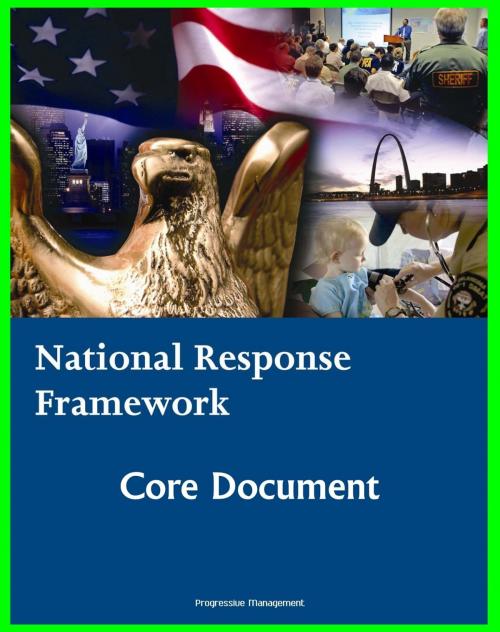National Response Framework (NRF): Homeland Security Program Core Document for Emergency Management Domestic Incident Response Planning to Terrorism, Terrorist Attacks, Natural Disasters
Nonfiction, Social & Cultural Studies, Political Science| Author: | Progressive Management | ISBN: | 9781458021380 |
| Publisher: | Progressive Management | Publication: | May 7, 2011 |
| Imprint: | Smashwords Edition | Language: | English |
| Author: | Progressive Management |
| ISBN: | 9781458021380 |
| Publisher: | Progressive Management |
| Publication: | May 7, 2011 |
| Imprint: | Smashwords Edition |
| Language: | English |
This document from the Department of Homeland Security and FEMA, the National Response Framework or NRF - presents the guiding principles that enable all response partners to prepare for and provide a unified national response to disasters and emergencies. It establishes a comprehensive, national, all-hazards approach to domestic incident response.
The National Response Plan was replaced by the National Response Framework effective March 22, 2008. The National Response Framework defines the principles, roles, and structures that organize how we respond as a nation. The National Response Framework: describes how communities, tribes, states, the federal government, private-sectors, and nongovernmental partners work together to coordinate national response; describes specific authorities and best practices for managing incidents; and builds upon the National Incident Management System (NIMS), which provides a consistent template for managing incidents. The National Response Framework is a guide that details how the Nation conducts all-hazards response- from the smallest incident to the largest catastrophe. This document establishes a comprehensive, national, all-hazards approach to domestic incident response. The Framework identifies the key response principles, as well as the roles and structures that organize national response. It describes how communities, States, the Federal Government and private-sector and nongovernmental partners apply these principles for a coordinated, effective national response. In addition, it describes special circumstances where the Federal Government exercises a larger role, including incidents where Federal interests are involved and catastrophic incidents where a State would require significant support. It lays the groundwork for first responders, decision-makers and supporting entities to provide a unified national response.
The NRF is written especially for government executives, private-sector business, and nongovernmental leaders and emergency management practitioners. The NRF's clear, simple style makes the serious work of incident management understandable for newly elected or appointed government officials, business executives, as well as seasoned practitioners. The NRF is addressed to senior elected and appointed leaders, such as Federal department or agency heads, State governors, mayors, tribal leaders or city managers - those who have a responsibility to provide for effective emergency management. The NRF also informs emergency management practitioners, explaining the operating structures and tools used routinely by first responders and emergency managers at all levels of government. The NRF retains the same core principles of the National Incident Management System (NIMS) in which first responders from different jurisdictions and disciplines can work together more closely to effectively respond to natural disasters and emergencies, including acts of terrorism. The NRF is built on the following five principles: Engaged partnerships; Tiered response; Scalable, flexible and adaptable operational; capabilities; Unity of effort through unified command; Readiness to act. Effective preparedness is a critical precondition for successful response.
This document from the Department of Homeland Security and FEMA, the National Response Framework or NRF - presents the guiding principles that enable all response partners to prepare for and provide a unified national response to disasters and emergencies. It establishes a comprehensive, national, all-hazards approach to domestic incident response.
The National Response Plan was replaced by the National Response Framework effective March 22, 2008. The National Response Framework defines the principles, roles, and structures that organize how we respond as a nation. The National Response Framework: describes how communities, tribes, states, the federal government, private-sectors, and nongovernmental partners work together to coordinate national response; describes specific authorities and best practices for managing incidents; and builds upon the National Incident Management System (NIMS), which provides a consistent template for managing incidents. The National Response Framework is a guide that details how the Nation conducts all-hazards response- from the smallest incident to the largest catastrophe. This document establishes a comprehensive, national, all-hazards approach to domestic incident response. The Framework identifies the key response principles, as well as the roles and structures that organize national response. It describes how communities, States, the Federal Government and private-sector and nongovernmental partners apply these principles for a coordinated, effective national response. In addition, it describes special circumstances where the Federal Government exercises a larger role, including incidents where Federal interests are involved and catastrophic incidents where a State would require significant support. It lays the groundwork for first responders, decision-makers and supporting entities to provide a unified national response.
The NRF is written especially for government executives, private-sector business, and nongovernmental leaders and emergency management practitioners. The NRF's clear, simple style makes the serious work of incident management understandable for newly elected or appointed government officials, business executives, as well as seasoned practitioners. The NRF is addressed to senior elected and appointed leaders, such as Federal department or agency heads, State governors, mayors, tribal leaders or city managers - those who have a responsibility to provide for effective emergency management. The NRF also informs emergency management practitioners, explaining the operating structures and tools used routinely by first responders and emergency managers at all levels of government. The NRF retains the same core principles of the National Incident Management System (NIMS) in which first responders from different jurisdictions and disciplines can work together more closely to effectively respond to natural disasters and emergencies, including acts of terrorism. The NRF is built on the following five principles: Engaged partnerships; Tiered response; Scalable, flexible and adaptable operational; capabilities; Unity of effort through unified command; Readiness to act. Effective preparedness is a critical precondition for successful response.















